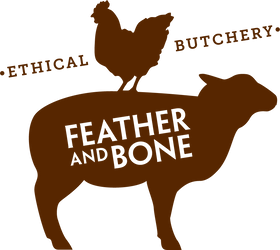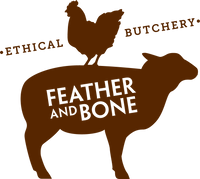The Ethical Omnivore
Our book, 'The Ethical Omnivore' is a user-friendly recipe and handbook that will open your eyes to a better way to buy, cook and eat.
"Wise, informed and occasionally funny, this is the cookbook for anybody who truly cares about the meat they eat. Part anecdote, part searingly intellectual, and always heartfelt and wonderfully written, it’s the kind of book only the butchers who think we should eat less meat could write."
- Matthew Evans
We wrote it to answer the questions we've been asked every day in our butchery for the last 17 years and it's an unapologetic paean of praise for regenerative agriculture and the importance of community.
We live in an affluent era marked by an increasingly fraught relationship to food, and meat, at least in first world countries, is increasingly the most controversial ingredient. Who do you believe? How do you find authentic information? The food landscape has become a minefield so how do you find a way forward with good conscience?
Our book explores the solution: living with a conscience; holding the people selling you your food to account; asking where things come from and how they were produced; doing your best not to waste anything and learning how to cook with all the parts of the animal - not just chicken breast or steak.
A way to live with less impact on the animals and environment that support us.
"This book – an earthy, warmly intelligent guide to the moral and environmental implications of what and how we eat - has come at exactly the right moment. Without shying from the hard truths, and without a speck of sanctimony, the authors set out a practical, meaningful and thoroughly inspiring path to a more hopeful food future."
- Charlotte Wood.
So what is an 'ethical omnivore'?
To us, an ethical omnivore is someone who consciously selects food from production systems that align with their value systems.
So, for example, if you think that animals should be treated humanely, you won't buy animal products from systems that incarcerate animals in sheds or feedlots. You'll read the packaging fine print or research the farm to be sure.
Or, if you think that climate change is an urgent threat, you won't buy food from farms that undermine biodiversity and ecosystem health by using interventionist chemicals to alter natural systems for short-term gain - prioritising scale, growth and speed to market over long term vitality and sustainability.
These farm practices have more in common with extractive mining than caring for the natural systems on which our survival depends.
Do you know where your food comes from?
If you stop and think about it, most of us often know very little about where our food comes from, how it's produced, how far it travelled to reach us and how many hands it passed through. To find out, you'll need time and good detective skills because our food production, distribution and retail systems are mostly very opaque and complex.
How do you know who to trust?
Food retailers are tapping in to customers' desire to purchase products that are environmentally sustainable. But if you're a time-poor customer in a shouty market place where every second product claims to help save the planet, how do you work out what's fact and what's fiction?
It's our mission to give you all the information you need to easily make the right choice for you and those you're feeding. To draw as clear a line of sight from the farm to your table as possible.
Get facts, not greenwashing.
We recognise that food choices are influenced by lots of things including time, money and knowledge and none of us get it right every time. (In fact, if you're getting it right half the time, you deserve a medal! But don't stop there...)
In our book, behaving ethically equates to taking responsibility for the impacts of your choices. Take the time to find partners you trust.
Choose regeneratively-farmed food that doesn't cost the planet.
"What Laura and Grant espouse is food that is better for the animals, better for the planet, better for our communities, and ultimately better for you."
- Matthew Evans



